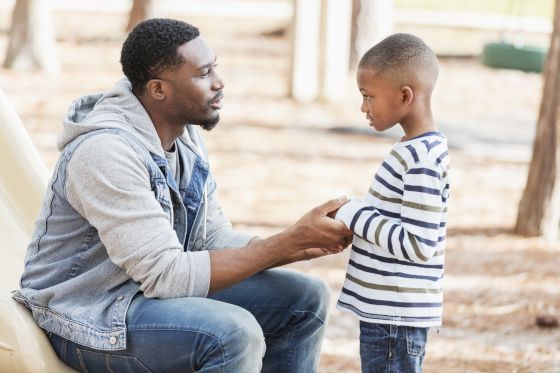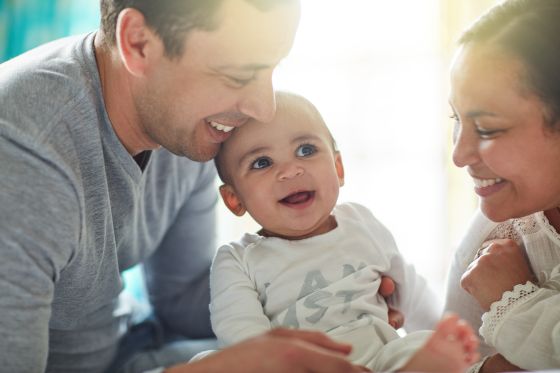Parenting an Adopted Child: A Complete Guide
Parenting an adopted child can be a beautiful experience. Adoption makes parenthood dreams come true for millions of Americans across the United States, and the journey continues long after a child is placed into the arms of waiting adoptive parents.
In many ways, parenting your adopted child will be no different than parenting a biological child. However, there are some important things you should know before even starting your family-building journey. Raising an adopted child will require unique commitment and consideration.
Fortunately, American Adoptions is here to help. Below, you’ll find some helpful hints and tips for raising an adopted child. Have questions about your unique adoption experience? Don’t be afraid to reach out to your adoption specialist at 1-800-ADOPTION anytime.
How to Parent an Adopted Child
Before any would-be parent starts the adoption process, they should educate themselves about the realities of parenting an adopted child. After all, their parenting strategy will influence their child’s identity and relationship with birth parents, as well as the overall family dynamic.
That’s why American Adoptions works closely with all prospective adoptive parents from the very beginning of their journey. Our specialists are trained in the realities of modern adoption, and they make sure every adoptive parent is ready for the unique challenges ahead. Only after all this education is done do we help them find adoption opportunities.
When you work with American Adoptions, you’ll have your specialist’s support long after placement. We will always be here to answer your questions and address your concerns about raising an adopted child. The adoptee is at the center of all we do here, and we want to help you succeed.
Challenges of Raising an Adopted Child
Many hopeful adoptive parents ask, “Is raising an adopted child hard?”
Not necessarily — but there are certain things to keep in mind about the complex journey of parenting an adopted child. Here are just a few:
1. Navigating Open Adoption Relationships
Almost all modern adoptions involve open adoption relationships. That means that adoptive parents and their child will have a relationship with the child’s birth parents after placement. Exactly what this looks like will vary — phone calls, texts, emails, letters or even in-person visits — and adoptive parents will have their own unique relationship with birth parents. However, modeling positive, open communication with birth parents is an important part of parenting an adopted child.
A child’s relationship with their birth parents will be unique. Whatever it looks like, it will be an important part of their life. Many adoptees report that positive relationships with their birth parents make their adoption story much easier to comprehend. And open adoption is proven to have many benefits for all involved.
If you plan on parenting an adopted child, do your research on open adoption. Prepare for what it will look like, and remember that this relationship is in the best interest of your child. You may have conflicting emotions about it, but know that open adoption is not “co-parenting” — but giving a child two sets of loving parent figures in their life.
2. Supporting Personal Growth and Identity-Building
While being adopted is not the only part of a person’s identity, it can play a key role in their childhood and adolescence. Some adoptees have mostly positive feelings about their adoption, while others mostly negative — but the majority of adoptees have a mix of both.
As your child grows up, they will have big questions about their adoption, like:
- Why did my birth parents “give me up”?
- Did my birth parents love me?
- What is my birth family like?
Open adoption will make some of these easy to answer, but many adoptees have back-and-forth feelings about their adoption story over the years. It will be your job to support them, but understand that there are some aspects of their adoptee identity they’ll have to sort out on their own.
3. Addressing Transracial Adoption Concerns
Some of the biggest challenges of raising an adopted child come when a child is of a different race or ethnicity than their adoptive parents. Parenting a child in a “colorblind” way is harmful to their development and self-identity; an adoptive parent needs to celebrate a child’s heritage and be as inclusive as possible.
This may mean making sacrifices — moving to a more diverse neighborhood, attending a different church, or driving farther distances to find racial mirrors for your child. Before opening up to transracial adoption, speak at length with an adoption specialist and read from transracial adoptees to confirm you can provide the parenting a child of a different race will need.
Tips for Raising an Adopted Child
While American Adoptions’ specialists will always provide guidance and education to adoptive parents, parents always hold a degree of responsibility in informing themselves and applying what they learn to their parenting style. Fortunately, there is a multitude of resources online to help you.
Here are some of the most important tips for raising an adopted child to keep in mind:
1. Always Be Honest and Open
Adoption is something to be celebrated — not something to be hidden. When you adopt a child, you will be the keeper of their story for many years. There will be some tough questions and moments in the years to come, but adoptive parents should always be open and honest with their child about their adoption story.
Whether you’re answering questions about your journey to adopt, the birth parents’ situation or your open adoption relationship, always give your child the information they deserve. When you are open and excited about their story, they will reflect those feelings.
2. Celebrate Your Child’s Unique Story
When parenting an adopted child, it can be tempting to treat them like any biological child. But their adoption story is a unique part of who they are, and you should celebrate it from the moment you bring your child home.
There should never be a time when your child “finds out” they were adopted. Instead, make adoption a natural part of their life; read them books about adoption and talk about their birth parents from the moment you bring them home. Again, your child will mirror your emotions, so the more you celebrate and normalize their story, the more they will, too!
3. Support Your Child’s Relationship with their Birth Parents
It’s normal to have conflicting feelings about your child’s relationship with their birth parents. After all, their biological family will fill a role in their life that you can’t. However, when raising an adopted child, you need to support their relationship with their birth parents, especially as it develops over the years.
You should never take that relationship personally; it’s completely natural for a child to be curious about where they come from. Focus on the positives that the open adoption relationship will bring your child, and emphasize your support and happiness for them and their birth parents.
Books on Raising an Adopted Child
Many adoptive parents find it helpful to read books while preparing to adopt. These resources can offer great tips on how to raise an adopted child happily and successfully; they often give an insight into an adoptee’s perspective.
Before you go down the adoption path, pick up some of these gems at your local library or bookstore:
- Twenty Things Adopted Kids Wish Their Adoptive Parents Knew
- The Children Money Can Buy: Stories from the Frontlines of Foster Care and Adoption
- The Open-Hearted Way to Open Adoption: Helping Your Child Grow Up Whole
- Real Parents, Real Children: Parenting the Adopted Child
- Making Sense of Adoption: A Parent’s Guide
Consider connecting with adoption support groups for more suggestions for books on raising an adopted child and other helpful resources.
Have more questions about parenting your adopted child? Reach out to your adoption specialist at any time for personalized advice.







 Top Articles
Top Articles